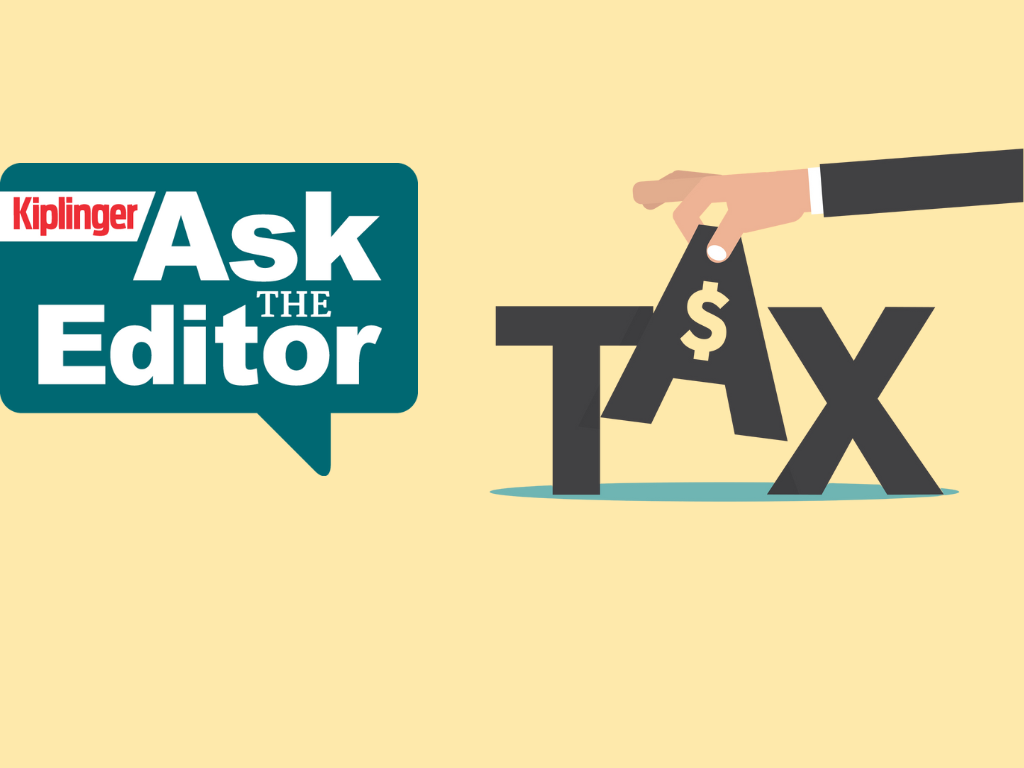Ask the Editor, August 15: Tax Questions on the OBBB, Tax Rates
In our latest Ask the Editor round-up, Joy Taylor, The Kiplinger Tax Letter Editor, answers four questions on the OBBB and tax rates.

Profit and prosper with the best of Kiplinger's advice on investing, taxes, retirement, personal finance and much more. Delivered daily. Enter your email in the box and click Sign Me Up.
You are now subscribed
Your newsletter sign-up was successful
Want to add more newsletters?

Delivered daily
Kiplinger Today
Profit and prosper with the best of Kiplinger's advice on investing, taxes, retirement, personal finance and much more delivered daily. Smart money moves start here.

Sent five days a week
Kiplinger A Step Ahead
Get practical help to make better financial decisions in your everyday life, from spending to savings on top deals.

Delivered daily
Kiplinger Closing Bell
Get today's biggest financial and investing headlines delivered to your inbox every day the U.S. stock market is open.

Sent twice a week
Kiplinger Adviser Intel
Financial pros across the country share best practices and fresh tactics to preserve and grow your wealth.

Delivered weekly
Kiplinger Tax Tips
Trim your federal and state tax bills with practical tax-planning and tax-cutting strategies.

Sent twice a week
Kiplinger Retirement Tips
Your twice-a-week guide to planning and enjoying a financially secure and richly rewarding retirement

Sent bimonthly.
Kiplinger Adviser Angle
Insights for advisers, wealth managers and other financial professionals.

Sent twice a week
Kiplinger Investing Weekly
Your twice-a-week roundup of promising stocks, funds, companies and industries you should consider, ones you should avoid, and why.

Sent weekly for six weeks
Kiplinger Invest for Retirement
Your step-by-step six-part series on how to invest for retirement, from devising a successful strategy to exactly which investments to choose.
Each week, in our Ask the Editor series, Joy Taylor, The Kiplinger Tax Letter Editor, answers questions on topics submitted by readers. This week, she’s looking at questions on the OBBB and tax rates. (Get a free issue of The Kiplinger Tax Letter or subscribe.)
1. Income tax rates
Question: Did the “One Big Beautiful Bill” act (OBBB) extend the lower federal income tax rates for individuals that were going to expire after 2025?
Joy Taylor: Yes. Federal income tax rates for C corporations, individuals, trusts and estates will stay the same. C corporations are taxed at a 21% rate. The individual income tax brackets are 10%, 12%, 22%, 24%, 32%, 35% and 37%. The federal income tax rates for trusts and estates are 10%, 24%, 35% and 37%. These are all permanent.
2. Income tax withholding tables
Question: Will the IRS adjust the 2025 federal income tax withholding tables to reflect the changes in the OBBB?
Joy Taylor: No. The IRS announced that it will not update the 2025 federal income tax withholding tables to account for the new tax breaks in the OBBB, such as the higher standard deduction, the write-offs for tips and overtime pay, and the $6,000 senior deduction for filers 65 and older. Although these new tax breaks begin in 2025, filers won’t reap the benefits of them until next year when they file their 2025 tax returns.
From just $107.88 $24.99 for Kiplinger Personal Finance
Become a smarter, better informed investor. Subscribe from just $107.88 $24.99, plus get up to 4 Special Issues

Sign up for Kiplinger’s Free Newsletters
Profit and prosper with the best of expert advice on investing, taxes, retirement, personal finance and more - straight to your e-mail.
Profit and prosper with the best of expert advice - straight to your e-mail.
3. Estate tax
Question: Did the OBBB lower or eliminate the top 40% federal estate tax rate?
Joy Taylor: No. The top federal estate tax rate stays at 40%. But the higher lifetime estate and gift tax exemption is now permanent, and is even bigger, beginning in 2026. The federal lifetime exemption for 2025 deaths is $13,990,000. Starting with 2026 deaths, the exemption rises to $15 million (and is indexed for inflation for each year thereafter). So fewer estates will have to file a federal estate tax return.
4. Net investment income tax
Question: Did the OBBB repeal the 3.8% surtax on net investment income of individuals with higher incomes?
Joy Taylor: No. The 3.8% net investment income (NII) tax was not changed in the OBBB. The tax applies to single filers with modified adjusted gross incomes (AGI) over $200,000, joint filers with modified AGI over $250,000, and married people filing separately with modified AGI above $125,000. For this purpose, modified AGI is defined as AGI plus tax-free foreign-earned income. The NII tax, which is added to the regular income tax, is due on the lesser of NII or the excess of modified AGI over the $200,000/$250,000/$125,000 thresholds. Investment income of trusts and estates can also be hit with the 3.8% NII tax if their 2025 AGI exceeds $15,650 and they have undistributed net investment income.
NII includes what is commonly thought of as investment income: Dividends, capital gains, taxable interest, annuities, royalties and passive rental income. Trade or business income derived through a passive activity is also NII, provided that the business income isn’t otherwise subject to self-employment tax.
For more details on the 3.8% NII tax, see our article “More People Are Paying This Tax On Investment Income Each Year.”
About Ask the Editor, Tax Edition
Subscribers of The Kiplinger Tax Letter, The Kiplinger Letter and The Kiplinger Retirement Report can ask Joy questions about tax topics. You'll find full details of how to submit questions in each publication.
Subscribe to The Kiplinger Tax Letter, The Kiplinger Letter or The Kiplinger Retirement Report.
We have already received many questions from readers on topics related to tax changes in the “One Big Beautiful Bill" act and more. We will continue to answer these in future Ask the Editor round-ups. So keep those questions coming!
Not all questions submitted will be published, and some may be condensed and/or combined with other similar questions and answers, as required editorially. The answers provided by our editors and experts, in this Q&A series, are for general informational purposes only. While we take reasonable precautions to ensure we provide accurate answers to your questions, this information does not and is not intended to, constitute independent financial, legal, or tax advice. You should not act, or refrain from acting, based on any information provided in this feature. You should consult with a financial or tax advisor regarding any questions you may have in relation to the matters discussed in this article.
More Reader Questions Answered
- All Ask the Editor Q&As
- Ask the Editor: Questions on the New Tax Law
- Ask the Editor: Questions on the $6,000 Senior Deduction
- Ask the Editor: Questions on home sales and taxes
- Ask the Editor: Questions on Inherited IRAs
Profit and prosper with the best of Kiplinger's advice on investing, taxes, retirement, personal finance and much more. Delivered daily. Enter your email in the box and click Sign Me Up.

Joy is an experienced CPA and tax attorney with an L.L.M. in Taxation from New York University School of Law. After many years working for big law and accounting firms, Joy saw the light and now puts her education, legal experience and in-depth knowledge of federal tax law to use writing for Kiplinger. She writes and edits The Kiplinger Tax Letter and contributes federal tax and retirement stories to kiplinger.com and Kiplinger’s Retirement Report. Her articles have been picked up by the Washington Post and other media outlets. Joy has also appeared as a tax expert in newspapers, on television and on radio discussing federal tax developments.
-
 Nasdaq Leads a Rocky Risk-On Rally: Stock Market Today
Nasdaq Leads a Rocky Risk-On Rally: Stock Market TodayAnother worrying bout of late-session weakness couldn't take down the main equity indexes on Wednesday.
-
 Quiz: Do You Know How to Avoid the "Medigap Trap?"
Quiz: Do You Know How to Avoid the "Medigap Trap?"Quiz Test your basic knowledge of the "Medigap Trap" in our quick quiz.
-
 5 Top Tax-Efficient Mutual Funds for Smarter Investing
5 Top Tax-Efficient Mutual Funds for Smarter InvestingMutual funds are many things, but "tax-friendly" usually isn't one of them. These are the exceptions.
-
 Ask the Editor, February 13: More Questions on IRAs
Ask the Editor, February 13: More Questions on IRAsAsk the Editor In this week's Ask the Editor Q&A, Joy Taylor answers questions on IRAs
-
 How to Open Your Kid's $1,000 Trump Account
How to Open Your Kid's $1,000 Trump AccountTax Breaks Filing income taxes in 2026? You won't want to miss Form 4547 to claim a $1,000 Trump Account for your child.
-
 7 Bad Tax Habits to Kick Right Now
7 Bad Tax Habits to Kick Right NowTax Tips Ditch these seven common habits to sidestep IRS red flags for a smoother, faster 2026 income tax filing.
-
 Ask the Editor, February 6: Questions on Federal Income Tax Deductions
Ask the Editor, February 6: Questions on Federal Income Tax DeductionsAsk the Editor In this week's Ask the Editor Q&A, Joy Taylor answers questions on federal income tax deductions
-
 Should You Do Your Own Taxes This Year or Hire a Pro?
Should You Do Your Own Taxes This Year or Hire a Pro?Taxes Doing your own taxes isn’t easy, and hiring a tax pro isn’t cheap. Here’s a guide to help you figure out whether to tackle the job on your own or hire a professional.
-
 Ask the Editor, January 30: Questions on Social Security Benefits Taxation
Ask the Editor, January 30: Questions on Social Security Benefits TaxationAsk the Editor In this week's Ask the Editor Q&A, Joy Taylor answers questions on the taxation of Social Security benefits
-
 Don't Overpay the IRS: 6 Tax Mistakes That Could Be Raising Your Bill
Don't Overpay the IRS: 6 Tax Mistakes That Could Be Raising Your BillTax Tips Is your income tax bill bigger than expected? Here's how you should prepare for next year.
-
 Will IRS Budget Cuts Disrupt Tax Season? What You Need to Know
Will IRS Budget Cuts Disrupt Tax Season? What You Need to KnowTaxes The 2026 tax season could be an unprecedented one for the IRS. Here’s how you can be proactive to keep up with the status of your return.